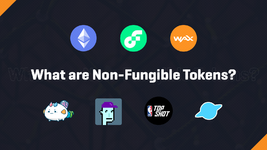AWASIOR
Known
- Messages
- 397
- Reaction score
- 95
- Points
- 28
Imagine if you could go back in time and snap up some first edition Pokemon cards. Cryptocurrencies are providing another opportunity to acquire collectibles that have the potential be worth a lot more in the future: Non-Fungible Tokens.
Non-Fungible Tokens (or NFTs) are cryptocurrency tokens that represent scarce, digital collectibles which are also indivisible and unique. The term ‘non-fungible’ just means that the tokens are distinguishable from each other and cannot be interchanged.
Cash is fungible since a $100 bill is interchangeable with any other $100 note. Cryptocurrencies like Bitcoin and Ethereum are fungible (at least, in theory) in the sense that each unit should be worth the same as any other (1 BTC = 1 BTC).
On the other hand, NFTs are not interchangeable. Each Non-Fungible Token is built on a smart contract that contains specific information that makes it unique, with the code verifying that it is the only digital asset with certain characteristics.
The ownership of art, collectibles, decentralized domain names, in-game items, music, virtual real estate (and much more) can be represented by NFTs. Similar to a Pokemon card, you cannot divide a NFT up into fractions. They are also distinguishable from each other, in the same way a shiny Blastoise card can differ from another shiny Blastoise in various aspects, such as whether it is in mint condition, whether it is a first edition and so on.
But some advantages of NFTs over traditional collectibles (such as your shiny Blastoise) are that the scarcity can be proven, and since they are digital, they're more durable. Every transfer is recorded on the blockchain, so you can cryptographically verify the historical prices and the ownership history through the underlying blockchain protocol.
Additionally, it is much easier to transfer NFTs as compared to their physical counterparts, since these collectibles live on public ledgers. Such a transfer can be made at any time, anywhere, and doesn’t rely on a broker or any other intermediary: all that is required is an internet connection and some crypto. Compared with selling a piece of art or a physical collectible, the logistics can be much more straightforward for NFTs.
Any smart contract platform can support NFTs. Some examples of public blockchains hosting NFTs include Ethereum, Flow, and WAX, with the most popular NFTs on each of these blockchains (based on all-time sales volume) being CryptoPunks, NBA Top Shot, and Street Fighter respectively.
Non-Fungible Tokens (or NFTs) are cryptocurrency tokens that represent scarce, digital collectibles which are also indivisible and unique. The term ‘non-fungible’ just means that the tokens are distinguishable from each other and cannot be interchanged.
Cash is fungible since a $100 bill is interchangeable with any other $100 note. Cryptocurrencies like Bitcoin and Ethereum are fungible (at least, in theory) in the sense that each unit should be worth the same as any other (1 BTC = 1 BTC).
On the other hand, NFTs are not interchangeable. Each Non-Fungible Token is built on a smart contract that contains specific information that makes it unique, with the code verifying that it is the only digital asset with certain characteristics.
The ownership of art, collectibles, decentralized domain names, in-game items, music, virtual real estate (and much more) can be represented by NFTs. Similar to a Pokemon card, you cannot divide a NFT up into fractions. They are also distinguishable from each other, in the same way a shiny Blastoise card can differ from another shiny Blastoise in various aspects, such as whether it is in mint condition, whether it is a first edition and so on.
But some advantages of NFTs over traditional collectibles (such as your shiny Blastoise) are that the scarcity can be proven, and since they are digital, they're more durable. Every transfer is recorded on the blockchain, so you can cryptographically verify the historical prices and the ownership history through the underlying blockchain protocol.
Additionally, it is much easier to transfer NFTs as compared to their physical counterparts, since these collectibles live on public ledgers. Such a transfer can be made at any time, anywhere, and doesn’t rely on a broker or any other intermediary: all that is required is an internet connection and some crypto. Compared with selling a piece of art or a physical collectible, the logistics can be much more straightforward for NFTs.
Any smart contract platform can support NFTs. Some examples of public blockchains hosting NFTs include Ethereum, Flow, and WAX, with the most popular NFTs on each of these blockchains (based on all-time sales volume) being CryptoPunks, NBA Top Shot, and Street Fighter respectively.
